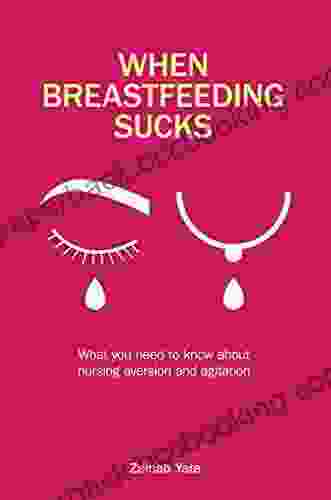What You Need To Know About Nursing Aversion And Agitation

: Understanding Nursing Aversion and Agitation
Nursing aversion and agitation are prevalent concerns that can significantly impact patient care. Understanding the causes, consequences, and effective interventions for nursing aversion and agitation is crucial for healthcare professionals to provide optimal care. This article aims to shed light on this topic, empowering caregivers with knowledge and strategies to address these challenges.
4.9 out of 5
| Language | : | English |
| File size | : | 3231 KB |
| Text-to-Speech | : | Enabled |
| Screen Reader | : | Supported |
| Enhanced typesetting | : | Enabled |
| Word Wise | : | Enabled |
| Print length | : | 256 pages |
| Lending | : | Enabled |
Causes of Nursing Aversion and Agitation
Nursing aversion, characterized by a strong dislike or resistance towards nursing care, can result from various factors:
- Past Negative Experiences: Traumatic or distressing nursing experiences in the past can create an aversion towards future interactions.
- Fear or Anxiety: The fear of pain, discomfort, or medical procedures can lead to aversion and agitation during nursing care.
- Sensory Overload: Patients with sensory sensitivities may experience discomfort or agitation from the lights, sounds, or touch associated with nursing care.
- Emotional Distress: Patients experiencing emotional distress, such as grief, anger, or depression, may exhibit aversion or agitation towards nursing care.
- Cognitive Impairment: Patients with cognitive challenges, such as dementia or intellectual disability, may have difficulty understanding or cooperating with nursing care.
Agitation, on the other hand, refers to excessive restlessness, irritability, or aggression that can stem from:
- Medical Conditions: Agitation can be a symptom of underlying medical conditions, such as infections, electrolyte imbalances, or neurological disFree Downloads.
- Medications: Certain medications, such as steroids or antipsychotics, can cause agitation as a side effect.
- Environmental Factors: Noise, overcrowding, or lack of privacy can trigger agitation in patients.
- Emotional Distress: Similar to nursing aversion, emotional distress can contribute to agitation during nursing care.
Consequences of Nursing Aversion and Agitation
Unresolved nursing aversion and agitation can have significant consequences for patients and healthcare professionals:
- Delayed or Impaired Care: Aversion and agitation can hinder the provision of necessary nursing care, leading to delayed treatment or suboptimal outcomes.
- Patient Distress: The experience of aversion and agitation can cause distress and anxiety in patients, exacerbating their medical condition.
- Increased Healthcare Costs: The management of nursing aversion and agitation can require additional resources and interventions, driving up healthcare costs.
- Staff Burnout: Frequent encounters with patients experiencing aversion and agitation can lead to burnout and compassion fatigue in healthcare professionals.
Effective Interventions for Nursing Aversion and Agitation
Addressing nursing aversion and agitation effectively requires a multifaceted approach involving:
- Assessment and Identification: Early identification of potential triggers and contributing factors is essential for tailoring interventions.
- Communication: Establishing clear and respectful communication with patients is crucial for understanding their fears and preferences.
- Education and Information: Providing patients with clear explanations about nursing procedures and potential discomfort can help reduce anxiety and improve cooperation.
- Environmental Modifications: Creating a calm and comfortable environment by minimizing noise, providing privacy, and attending to sensory needs can alleviate agitation.
- Non-Pharmacological Interventions: Non-pharmacological interventions, such as music therapy, aromatherapy, or touch therapy, can provide calming effects and reduce agitation.
- Medication Management: In some cases, medications may be necessary to control agitation and manage underlying medical conditions.
- Staff Training: Healthcare professionals should receive training on recognizing and managing nursing aversion and agitation effectively.
: Enhancing the Patient-Nurse Relationship
Nursing aversion and agitation are complex challenges that can impact the quality of patient care and the healthcare experience. By understanding the causes, consequences, and effective interventions for nursing aversion and agitation, healthcare professionals can create a more positive and collaborative patient-nurse relationship. Through tailored approaches and a compassionate mindset, we can enhance the well-being of patients and foster a supportive and healing environment.
4.9 out of 5
| Language | : | English |
| File size | : | 3231 KB |
| Text-to-Speech | : | Enabled |
| Screen Reader | : | Supported |
| Enhanced typesetting | : | Enabled |
| Word Wise | : | Enabled |
| Print length | : | 256 pages |
| Lending | : | Enabled |
Do you want to contribute by writing guest posts on this blog?
Please contact us and send us a resume of previous articles that you have written.
 Book
Book Novel
Novel Page
Page Chapter
Chapter Text
Text Story
Story Genre
Genre Reader
Reader Library
Library Paperback
Paperback E-book
E-book Magazine
Magazine Newspaper
Newspaper Paragraph
Paragraph Sentence
Sentence Bookmark
Bookmark Shelf
Shelf Glossary
Glossary Bibliography
Bibliography Foreword
Foreword Preface
Preface Synopsis
Synopsis Annotation
Annotation Footnote
Footnote Manuscript
Manuscript Scroll
Scroll Codex
Codex Tome
Tome Bestseller
Bestseller Classics
Classics Library card
Library card Narrative
Narrative Biography
Biography Autobiography
Autobiography Memoir
Memoir Reference
Reference Encyclopedia
Encyclopedia Kindle Edition
Kindle Edition Shelly Westerhausen
Shelly Westerhausen Thomas Poulsom
Thomas Poulsom Tenth Edition Revised Kindle Edition
Tenth Edition Revised Kindle Edition Michael Hirsh
Michael Hirsh Tiffani Bova
Tiffani Bova Lisette Kristensen
Lisette Kristensen Michael Darlow
Michael Darlow Laura Vae Gatz
Laura Vae Gatz Nancy Lawson
Nancy Lawson Robert Ullian
Robert Ullian Leslie O Dell
Leslie O Dell Reed K Holden
Reed K Holden Marc Gonsalves
Marc Gonsalves Lowey Bundy Sichol
Lowey Bundy Sichol Patricia Preciado Martin
Patricia Preciado Martin Will Corona Pilgrim
Will Corona Pilgrim Sunday Adelaja
Sunday Adelaja Mats Alvesson
Mats Alvesson Marty Human
Marty Human
Light bulbAdvertise smarter! Our strategic ad space ensures maximum exposure. Reserve your spot today!

 Jaylen MitchellClassical Learning and the Progress of Virtue: Giants in the History of...
Jaylen MitchellClassical Learning and the Progress of Virtue: Giants in the History of... Ike BellFollow ·9.9k
Ike BellFollow ·9.9k Kurt VonnegutFollow ·6.4k
Kurt VonnegutFollow ·6.4k Cortez ReedFollow ·17.7k
Cortez ReedFollow ·17.7k John GrishamFollow ·13.6k
John GrishamFollow ·13.6k Floyd RichardsonFollow ·16.2k
Floyd RichardsonFollow ·16.2k Derrick HughesFollow ·19.8k
Derrick HughesFollow ·19.8k Raymond ChandlerFollow ·11.3k
Raymond ChandlerFollow ·11.3k Henry David ThoreauFollow ·16.8k
Henry David ThoreauFollow ·16.8k

 E.M. Forster
E.M. ForsterBluewater Walkabout: Into the Pacific
An Unforgettable...

 Joseph Foster
Joseph FosterUnlock the Secrets of Standardized Test Success with Test...
Are you tired of struggling with standardized...

 Joe Simmons
Joe SimmonsUnlock Learning with Flash Cards for Kindergarten:...
Ignite a Passion for...

 Raymond Parker
Raymond ParkerJourney into the Enchanting World of "The Heart Kingdom"...
A Timeless Tale of Love,...
4.9 out of 5
| Language | : | English |
| File size | : | 3231 KB |
| Text-to-Speech | : | Enabled |
| Screen Reader | : | Supported |
| Enhanced typesetting | : | Enabled |
| Word Wise | : | Enabled |
| Print length | : | 256 pages |
| Lending | : | Enabled |














